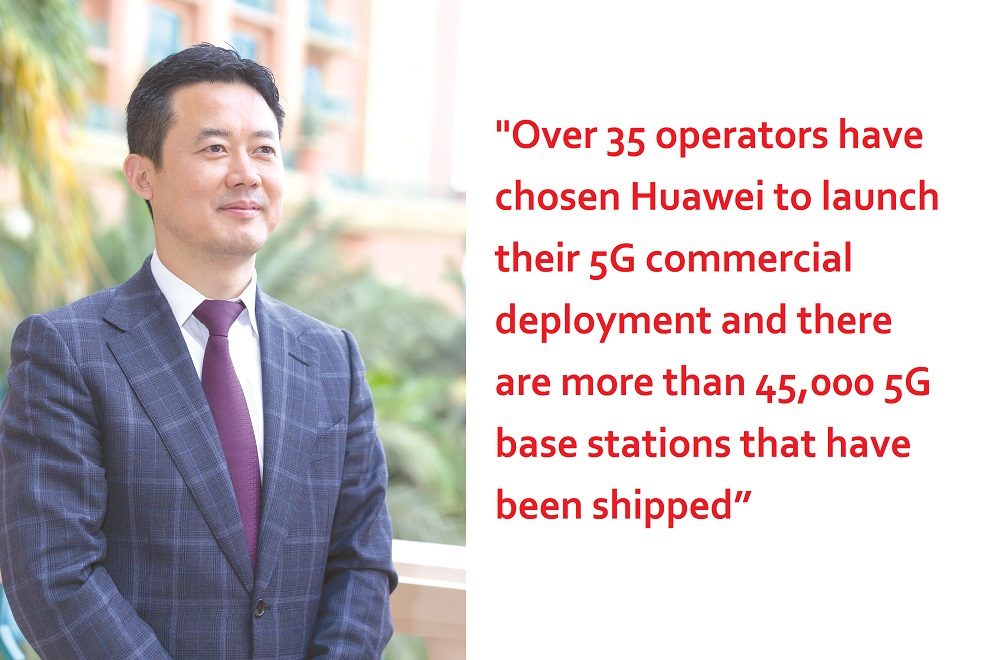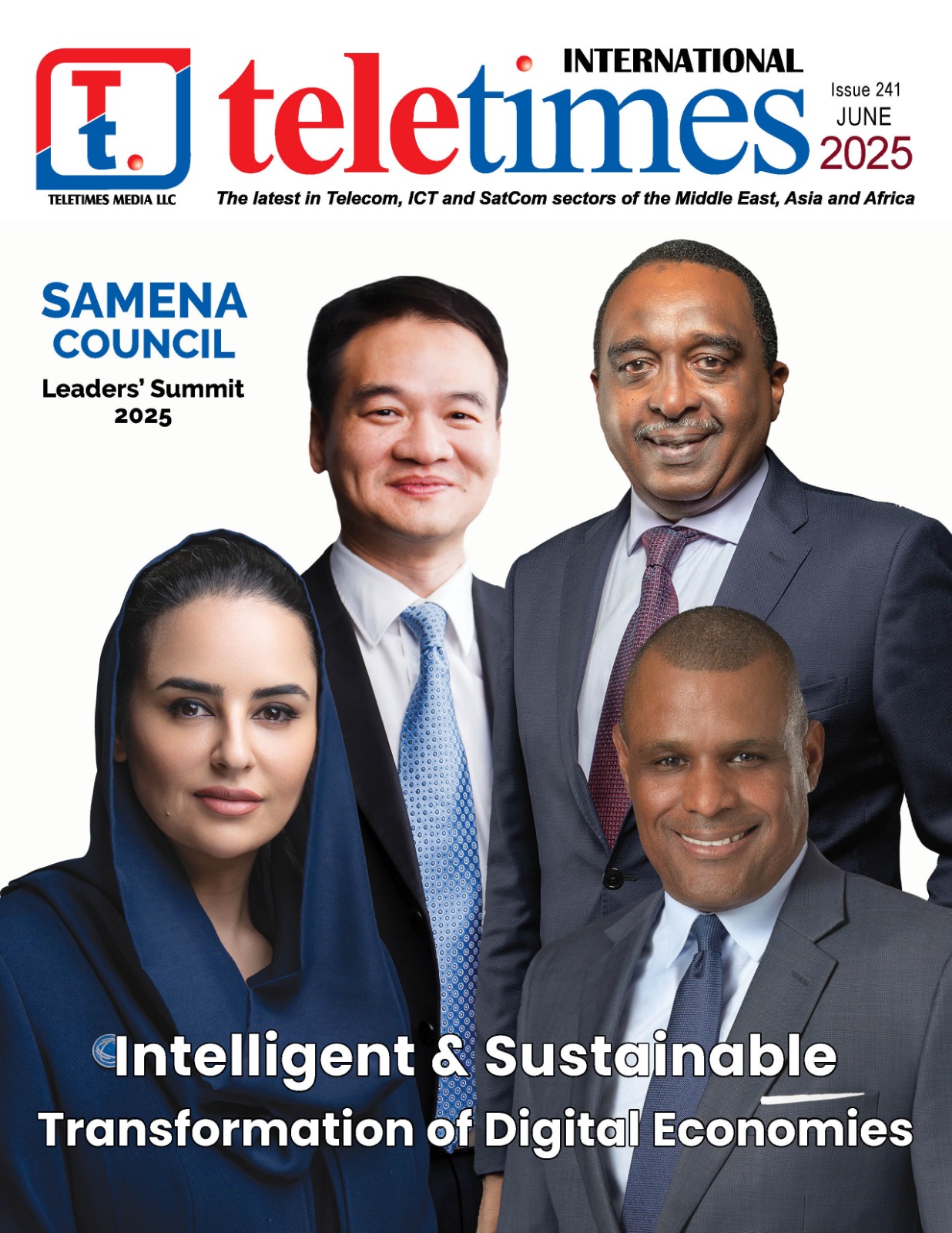Charles Yang
President of Huawei Middle East speaks to Teletimes
Interview: Khalid Athar
Khalid Athar: How does the transition from 4G to 5G compare to the transition from 3G to 4G?
Charles Yang: Comparing the move from 3G to 4G, transition from 4G to 5G is happening faster. In order to achieve 500M users, it will take 9 years for 3G and 6 years for 4G, but for 5G, we think it will take only 3 years.
First, it is because global operators have agreed on one unified 3GPP standard for 5G. Instead of choosing their sides as they have done in the 3G to 4G transition, 5G adoption has a clearer roadmap.
Second, the development of 5G devices is also happening faster than expected. According to GSA, there are already 5 chipset vendors and 33 5G devices that have been announced up to date. In fact, it is the first time in the history of mobile communications that the 5G networks and terminals grow mature at the same time.
Third, the 5G use cases are growing mature. Today, there are already two mature 5G use cases. Aside from eMBB service via 5G smartphone, the maturity of air fiber technology will even protect the 5G investment of the operators. More and more use cases, such as AR/VR, drone and even vehicle, are developed rapidly and the launch of 5G will even accelerate the growth of these use cases.
In short, all the factors that 5G needs are ready now, thus the development of 5G network is going super-fast and out of expectation. On 4th of April, Korea already launched its national 5G service. LG U+ will have its 50,000 5G sites on air within this year. Meanwhile, China CMCC has started building 500,000 5G sites to be completed by 2020. Over 35 operators have chosen Huawei to launch their 5G commercial deployment and there are more than 45,000 5G base stations that have been shipped.
KA: How do you think 5G is going to impact the Middle East market?
CY: 5G is the basic infrastructure of the intelligent society in the future. Just Like the transformation brought by electricity to society over one hundred years ago, 5G will bring a revolutionary change to the future of information society.
The impact of 5G on the Middle East region can be descripted from three aspects:
First, at a national level, 5G is one of the major enablers of the implementation of national vision plans, which will promote economic growth and open new jobs.
Second, at an industry level, 5G will promote digital transformation among industries and improve their overall efficiency, similar to what computer science brought us in the past three decades.
Third, at a carrier level, with 5G, carriers can enter the vertical business domain from pure communications service providers, and have the potential to become a new service platform provider and gain more business opportunities.
This year, operators in the GCC countries are all gearing up for 5G launches. Many operators have announced their plans to deploy large scale network. These 5G networks will bring positive impact on the GCC in the coming years.
KA: What do you think unique value of 5G that is encouraging operators to deploy the network in the initial phase?
CY: There are 3 business value pillars of deploying 5G in this early phase:
1- “4G-5G” Dual model can significantly improve upfront investment efficiency: benefiting from dynamic sharing technologies such as “CloudAIR”, operators can reduce bandwidth cost of traditional MBB services significantly, as investing in 5G equipment also allows operators to serve 4G services.
2- “Fiber from Air” enables new business model: 5G is capable of delivering 100Mbps experience for home users, therefore charging by guaranteed experiences for 5G home broadband users are feasible.
3- 5G paves the road of digitalization for verticals: 5G accelerates the digitization of society. By enabling the diversified eco-system partners, 5G can improve the quality of communication in all industries, not only human to human, but also machine communication. Despite that we are still in the early stages, we can see that the ecosystem building of innovative solutions has already started by the operators, technology providers, solution developers, and all innovators from all industries.
KA: How will 5G revamp the IoT and AI space and make the smart city vision a reality for all socio-economic classes in the Middle East?
CY: 5G, as the crucial digital service enabler, is able to offer ultra-high-speed (more data) and ultra-low-latency (more responsive) to deliver huge amounts of data collected from more IoT. With this intelligent connectivity (5G, IoT and AI), it will be much easier to handle thousands of devices simultaneously. Currently, there are about 1000 cities around the world that have planned or started to build smart cities. In order for a mobile network to carry the weight of the future smart city, it will require a fast, responsive, as well as stable network like 5G.
There are some key factors to consider in order to ensure that a smart city program is designed to be inclusive of all socio-econic classes. For example when we look at basic needs of access to power, water, food and access to the internet; yes these days access to the internet should be considered a basic need. Our cities can become more resilient in these basic needs by, for example ensuring distributed energy generation requirement for all new building and encouraged for existing real estate stock. This not only ensures resilient supply but also can encourage the sharing economy; which is based on the principle of ‘I have, you need’. I. E. I have something of value to trade with you in this case I may generate more energy in my home than I need which I could either sell or gift to others in my neighborhood or beyond. Similar principles can be applied to other resources in the city to ensure better utilization whilst ensuring everyone feels they have a stake in the city.
Regarding access to the internet, it this necessary to ensure digital inclusion, especially in a world where those who have access also have more opportunities. So this levels the playing field, of course broadband access needs to be affordable along with affordable smart phones and devices so that not only city serviced can be accessed more readily but also everyone can participate in the sharing economy. Identity and reputation become critical components for which governments and city authorities play a key role, here again our smart phone becomes a key enabler.
Of course as we digitize and connect more things, security and data center availability also become foundational to city resilience. The ability to have high reliability, scalability and rapid deployment of data centers and the networks connecting them enable a level playing for all residents, businesses and visitors regardless of their socio-economic background. In order to fully release the potential of this intelligent connectivity on a global level, we still have to wait until 5G comes in, and only until then will these industries be able to get a chance to leverage technology.
KA: How do you see the future of the ME telecom market? How does it compare to other regional markets in your opinion?
CY: As industry digitalization develops, 5G will be the fundamental of future society connection for personal, home, and industry. Operators will provide ultra-broadband, low latency, and ubiquitous connection to support the development. The telecom industry will also be developed greatly.
Through the close cooperation between governments entities, operators, vendors and vertical partners, Middle East countries are standing in front at the first wave of 5G commercial launch; meanwhile, standing in front of the world.












